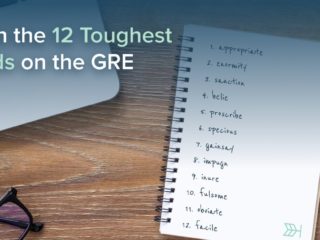| Getting your Trinity Audio player ready... |
Last Updated on January 15, 2025
Just about every GRE test-taker wonders how to learn vocabulary for GRE Verbal in the quickest, most effective way possible. Vocabulary memorization is an essential part of preparing for the GRE Verbal section. The problem is, there are TONS of vocab words to master if you want to earn a good Verbal score. Even students starting their GRE test prep with a broad lexicon generally need to devote a significant amount of study time to vocabulary acquisition.
KEY FACT:
Even students with a broad vocabulary generally need to devote significant study time to GRE vocab prep.
So, in this article, we’ll discuss some key strategies to help you learn GRE vocabulary, including:
- how to memorize GRE vocabulary
- how to engage in effective GRE vocabulary practice
- how to study GRE vocab fast
- how to stop forgetting GRE words
Additionally, we’ll answer some common questions about GRE vocabulary preparation, including how many words to learn.
By the time you’re finished reading, you’ll have the vocabulary strategies you need to earn a top Verbal score!
Here are the topics we’ll cover:
- How Many Words Do You Have to Know for the GRE Verbal Section?
- How Much Time Should You Spend Studying GRE Vocabulary Words?
- GRE Flashcards: The Secret Weapon for Improving Your Vocabulary
- Key Takeaways
- What’s Next?
To start, let’s answer the 2 most common questions I hear from students wondering how to study GRE vocabulary. First, we’ll answer the question of how many words to study. Then, we’ll discuss how long that studying will take.
How Many Words Do You Have to Know for the GRE Verbal Section?
One of the first questions I hear from students starting their GRE test prep is, how much vocabulary do I have to study for GRE Verbal? When they hear that they may need to know 1,000+ GRE vocab words to be ready for whatever Verbal questions they see on test day, they’re naturally worried.
The thing is, even if your vocabulary knowledge isn’t exceptionally broad, you’re bound to be familiar with many GRE vocabulary words. Why? Because many of them are words you will have encountered already in academic and professional settings. So, strictly speaking, you may need to know 1,000+ words. However, your starting base of knowledge will affect how many new words you actually need to learn.
That said, there is a large pool of words from which the GRE draws, and you can’t predict exactly which words will appear on any exam. So, even if you already have a broad vocabulary, you probably will still need to learn at least a few hundred vocab words over the course of your GRE test prep.
KEY FACT:
You may need to know 1,000 or more vocab words to be prepared for the GRE Verbal section.
So then, how long does it take to learn 1,000 words for GRE Verbal, or at least a few hundred? Let’s discuss.
How Much Time Should You Spend Studying GRE Vocabulary Words?
When you study GRE words, your goal should be steady, continuous progress over the entirety of your test prep. This goal may seem counterintuitive if you want to learn a large number of vocab words as quickly as possible. However, GRE vocab prep is much more effective if you treat it as a cumulative process, not a data dump.
So, firstly, it is essential that you study GRE vocabulary every day. If you study vocabulary words only intermittently — say, a few days a week or in long sessions on the weekends — your progress will likewise be only intermittent.
If you study vocab just a few days a week, your timeline for learning all the words you need to know will be extended considerably. Moreover, you may have trouble retaining what you learn, because you won’t be reinforcing your knowledge with daily GRE vocab practice.
If you study GRE words only in weekend cram sessions, you’ll again probably forget much of what you’ve studied. Cramming GRE vocabulary does not work. Learning vocabulary words is more memorization-heavy than other types of GRE test prep, and there are only so many things our brains can memorize in short succession.
So, as most of us don’t have photographic memories, vocabulary memorization is most effective when we engage in it consistently over time, rather than try to do a ton of it at once. Unfortunately, it’s very tempting to cram when we have a large number of words to learn in what, for many of us, may be a relatively brief amount of preparation time before test day.
TTP PRO TIP:
Study GRE vocabulary every day.
Another complicating factor is that vocab study should not make up the bulk of your GRE Verbal preparation each day.
Don’t Neglect Other Aspects of Your GRE Verbal Prep
Many students make the mistake of thinking that all they need to do to prepare for the GRE Verbal section is memorize a bunch of vocab words. However, simply memorizing a GRE word list is not going to properly prepare you to earn a great Verbal score.
Rather, there are numerous concepts, skills, and strategies test-takers must master to perform well on GRE Verbal questions. If you neglect those skills, you’ll quickly find that, while you may do all right on easy-level Verbal practice questions, you struggle to consistently perform well on medium- and hard-level questions.
So, in order to properly prepare for GRE Verbal, you’ll likely need to spend the majority of your Verbal study time learning and practicing things other than vocabulary, things such as:
- the mechanics and logic of GRE Verbal questions
- the tricks and traps that Verbal questions employ
- how to analyze Verbal questions efficiently
- specific strategies for tackling each Verbal question type
Remember also that when you study and answer Verbal practice questions, you’ll likely have to grapple with many of the words you’ve seen in your vocab study. That contextual vocabulary learning is an important complement to your vocab-focused prep because it helps to solidify and add dimension to your vocabulary knowledge.
With all this in mind, let’s discuss how to determine how much of your daily GRE test prep time to spend on studying vocabulary specifically.
TTP PRO TIP:
You need to more than just memorize vocab words to prepare for the GRE Verbal section.
Calculating Daily GRE Vocab Prep Time
The tricky thing about determining how much of your GRE test prep time to spend on improving your vocabulary is that the right amount is different for every student. So, determining the right amount for you may take some trial and error.
That said, a good starting point for many students is about 30 minutes of daily, dedicated GRE vocab prep. So, if for example on weekdays you engage in GRE test prep for 2 hours each day, a quarter of your total study time would be devoted to studying vocabulary.
Of course, every GRE student starts from a different place, has different goals, and learns at a different rate. So, if for example you’re a nonnative English speaker who knows that vocabulary is your weak area, consider starting with 45 minutes of daily vocab study, and adjust as necessary.
On the other hand, if you know that vocab is one of your strong suits, you could start off doing 20 minutes of vocab study each day, so you can focus more on other areas of your GRE prep.
Regardless of where you start, periodically assess your progress and make adjustments sooner rather than later. If you’re having trouble moving past easy-level Text Completion and Sentence Equivalence questions, or you’re frequently getting questions wrong because you don’t know the definitions of words, you may need to increase your vocab study time.
TTP PRO TIP:
Aim for 30 minutes of dedicated GRE vocab prep each day, adjusting as necessary based on your performance and starting level of vocab knowledge.
So, how do you maximize the value of your 30 minutes per day? Let’s discuss how to memorize vocab for the GRE as efficiently as possible.
GRE Flashcards: The Secret Weapon for Improving Your Vocabulary
Many GRE students make the mistake of trying to learn vocab by poring over sprawling GRE vocabulary lists. Vocabulary lists are great for seeing what words you need to learn and getting accurate definitions. However, reading GRE word lists is not an effective method for efficiently memorizing vocabulary.
On the contrary, studying vocabulary from a giant list is monotonous and draining. Your mind may wander. The definitions may start to wash over you without really sinking in. You also may start to get frustrated looking at what seems like an endless task.
Additionally, you need a simple method for tracking 3 key aspects of your vocab study:
- which words you know well
- which words you know somewhat
- which words you don’t know at all
Tracking this information in a single spreadsheet or list, and then finding what you need to study at any given time, is a time-consuming and disorganized process.
Flashcards solve these problems. In fact, the real reason to find a large, reputable GRE vocabulary list is so you can make flashcards based on it. When students ask me how to learn GRE vocab efficiently, my answer is always the same: make flashcards!
In fact, I recommend that GRE flashcards, whether digital or handwritten, be their primary tool for studying vocab words. To make things easy on yourself, find a GRE prep course that includes vocab flashcards. For example, the TTP course provides about 1,200 digital GRE vocab flashcards that include concise definitions, synonyms, and example sentences for each word. Plus, TTP gives you the ability to create your own custom cards.
TTP PRO TIP:
Make flashcards your primary tool for studying GRE vocab.
Let’s discuss some reasons why flashcards are a great tool and how to study GRE vocabulary most effectively with them.
Flashcards Make Vocabulary Acquisition Easier
Wondering how to learn new words for GRE Verbal? I can tell you that flashcards are a fantastic memorization tool.
One reason flashcards are better for vocabulary memorization than word lists are is that flashcards isolate each word and definition. So, you can really focus on what you’re learning and form an image of it in your mind. This aspect of studying flashcards will aid in your vocab retention significantly.
Additionally, you can shuffle your GRE flashcards from time to time to give your brain an added challenge and help ensure that you’re truly learning the words you study. Shuffling is also a great idea if you’re quizzing yourself on previously learned words.
TTP PRO TIP:
Shuffle your flashcards to give your brain an added challenge and help ensure that you’re truly mastering the words you study.
Flashcards Make GRE Vocab Practice Easier
Your GRE Verbal vocabulary practice will be far more organized if you use flashcards instead of a big list as your primary study tool. For example, as you use them, you can separate your flashcards into “mastered” and “not mastered” piles. Then, without having to make any notations or reorganize a spreadsheet, you’ll know exactly which words you need to focus on at any given time.
You can also easily dip back into the “mastered” pile every so often to quiz yourself on previously learned words. And if you find that you’ve forgotten any definitions, you can add those cards back to the “not mastered” pile.
Aside from keeping you organized, flashcards make GRE vocab practice easy because you can use them on the go. Thus, you can fit in quick study sessions or vocabulary exercises anytime, anywhere. A daily commute to work or school, a lunch break, waiting in line at the supermarket, or waiting for an appointment at the dentist’s office are all great opportunities to pull out your flashcards and get in your daily GRE vocabulary review. Even a few minutes is enough to quiz yourself on some words. It all counts toward your vocab study time!
TTP PRO TIP:
Separate your flashcards into “mastered” and “not mastered” piles to track which GRE vocabulary words you need to focus on and which you need to occasionally review.
Flashcards Make GRE Vocab Prep More Engaging
We’ve already discussed how memorizing words off an endless list can be a mind-numbing and frustrating process. Well, another huge benefit of using flashcards is that you can gamify your GRE vocab prep, thereby making it much more engaging. And when you’re more engaged in your studying, you’re much more likely to retain what you learn and to feel more motivated to study.
There are all sorts of vocabulary exercises you can come up with to gamify your studying with flashcards. How many definitions can you remember in a row? In a minute? In five minutes? What if you turn the cards around and read the definitions first? Can you think of the word that goes with each definition? How many new words can you learn in a half hour? Get creative and challenge yourself. Have friends or family quiz you, too.
Remember, you may be studying 1,000+ GRE vocabulary words over the course of your test prep. So, you have to do what you can to keep the process interesting and fun. Moreover, in order to make your limited study time productive and effective, you have to make sure that you are an active participant in your learning. If you’re instead passively ingesting an endless stream of information, you won’t retain what you study.
TTP PRO TIP:
Gamify your vocabulary flashcard study to make it more engaging, more challenging, and ultimately more effective.
Key Takeaways
You now know how to learn vocab for GRE Verbal! Remember the following when you’re planning and engaging in your GRE vocab prep:
- You may need to know 1,000+ GRE vocab words to be ready for whatever could come your way on test day.
- Even if you already have a broad vocabulary, you probably will still need to learn at least a few hundred vocab words over the course of your GRE test prep.
- Start by aiming for 30 minutes of dedicated GRE vocab prep each day, adjusting as necessary based on your performance and starting level of vocab knowledge.
- Study or practice with GRE vocabulary every day.
- Don’t neglect other aspects of your GRE verbal prep.
- Make flashcards your primary tool for studying GRE vocab.
- Gamify your vocabulary flashcard study to make it more engaging, more challenging, and ultimately more effective.
What’s Next?
Now that you know how to study vocab for the GRE most effectively, you may want to check out these 6 tips for mastering GRE Critical Reasoning and these 7 tips for improving your performance in GRE Reading Comprehension.
Happy studying!



